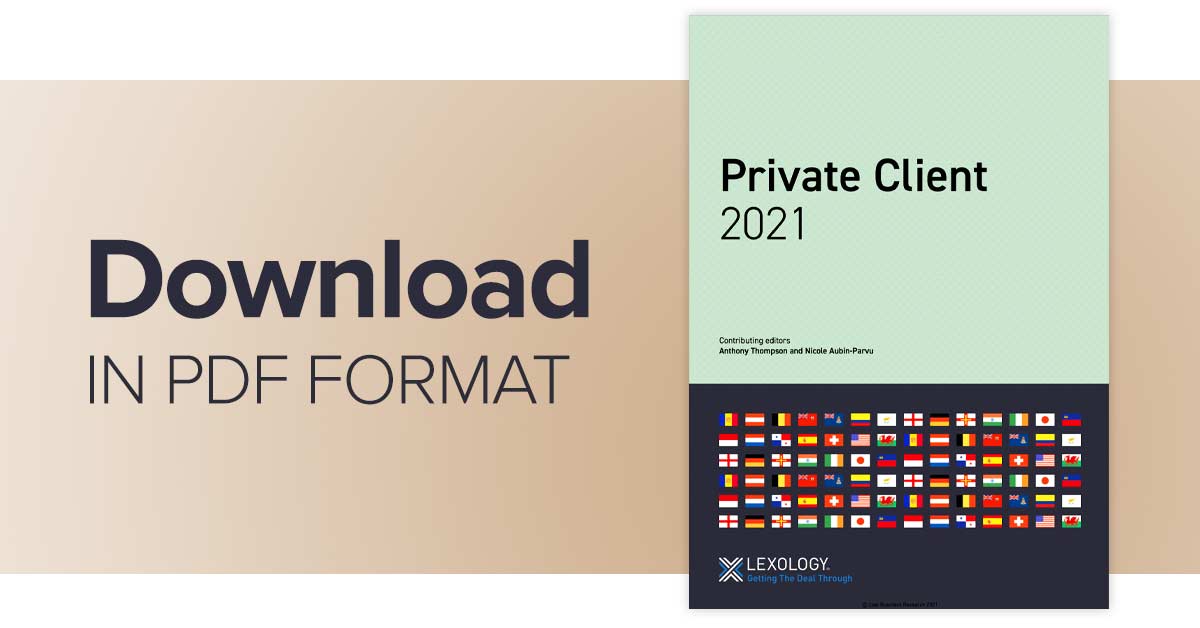Private Client 2021 - Global overview
Forsters' Private Client team were pleased to author the Global overview for Lexology Getting the Deal Through's Private Client 2021 guide.
2020 was a turbulent and unprecedented year worldwide. In this article, we reflect on some of the key global challenges and changes that affected private clients, in a year that grounded even the most internationally mobile individuals. We explore the key issues including:
- Covid-19 related trends
- Wealth trends
- Cultural priorities
- Tax compliance and transparency initiatives
- Tax evasion and avoidance
- Immigration
2020 has been a year like no other. In previous years we have written of the international mobility of wealthy people who divide their time between properties in different jurisdictions and choose where to live or invest according to the value they place on various factors, including the following (in no particular order):
- stability of the economy and tax system;
- security of the person and property within the jurisdiction and a strong rule of law;
- respect for family life and a developed education system; and
- a thriving environment in which to do business.
While all these factors remain relevant even in 2020 and will continue to do so long-term, this year's covid-19 pandemic has forced people to remain in one jurisdiction for substantial periods of time. International travel has been possible on an intermittent basis, with different rules applying to different jurisdictions. However, with countries becoming subject to complete lockdown and other less drastic restrictions throughout the year, a truly international business and home life has been virtually impossible during most of 2020 even for those with access to private jets.
For some individuals, this may have affected their status for tax purposes in unanticipated ways. Many countries that tax according to an individual's residence status, and measure that based on days spent in that jurisdiction in any tax year, have introduced concessionary arrangements this year to assist those who have been forced to remain in one jurisdiction for longer than usual. The value of such measures varies from one country to another and, as a result, peripatetic individuals may find themselves subject to tax in one or more jurisdictions this year, where that would not normally be the case.
Covid-19-related trends
During the pandemic, individuals and businesses have adapted rapidly to virtual forms of communication (it Is amazing now to think that many, perhaps most, people had never heard of Zoom and other virtual communication platforms prior to March 2020). However, few have not missed the opportunity to travel freely, whether for business or personal reasons. Most would also agree that while online platforms enable businesses and personal matters to be run on a day to day basis, face-to-face communication is still preferable for people to begin professional and personal relationships and to take forward important discussions of matters such as wealth and succession planning, family governance structures and creative business ideas. Thus, everyone is looking forward to the end of the current restrictions to our lives and the ability to travel freely.
The pandemic has also given people additional insight into the effectiveness or otherwise of different governments in handling the current crisis. This may affect their future decisions as to where to live and make investments. The types of investment they make, particularly in property, may also be affected by their experiences in lockdown. investing in property with a garden or other form of outdoor space may appear to be sensible after recent restrictions and, for those for whom it is an option, private aircraft may also be seen as a sensible business investment rather than a luxury.
The move to working from home resulting from the covid-19 pandemic also appears likely to become a longer-term trend, potentially affecting the future of our cities and commercial property generally. Again, wealthy investors will be looking at likely trends when considering where and how best to invest and to develop their own businesses.
Despite all these additional considerations, it will almost certainly continue to be rare for all desirable attributes to exist in the same jurisdiction. For example, a country may be a good place in which to do business but not necessarily an ideal place to bring up a young family or to own property. Furthermore, and as this year has highlighted, the attributes of jurisdictions can change over time. For example, where will the United Kingdom stand in five years’ time once the economic fallout from the pandemic and the country’s departure from the European Union (Brexit) take effect?
With this in mind, many wealthy people are likely to continue to divide their lives and investments between different jurisdictions. As a result, even without the effects of recent travel restrictions, they may find that they are regarded as resident in more than one country for the purposes of tax, and that different systems of law apply to the succession of their property in different jurisdictions. For example, an individual’s domicile may be the critical factor in determining succession to his or her property in one jurisdiction, while nationality or habitual residence may be the key determinant in another. One country may permit complete freedom of disposition over an individual’s estate, while another has strict rules as to the categories of heirs who may inherit property, and in what shares.
Accordingly, before wealthy individuals move to, or invest in property, in a new country, it is vital that they understand how the rules that apply to their personal lives, their property and their tax status may change.
Wealth trends
For many generations, the developed countries of the West were the primary focus of private client lawyers and other professionals focused on individual and family wealth. It was in the West that concepts such as trust law in the common law world and the civil law foundation developed as vehicles to protect and manage wealth for the benefit of generations to come.
This has been changing for some time and, for several years, Asia-Pacific led both North America and Europe in terms of its high net worth population and overall wealth. However, according to the Cap Gemini World Wealth Report 2020, after a lengthy period of growth, in 2019 this reversed, with developed countries once more leading global wealth growth, and North America at the top with 11 per cent wealth growth. The ultra-high net worth population increased most, by 9.1 per cent, but with less impressive wealth growth of 8.2 per cent. Interestingly, despite the uncertainty surrounding Brexit during 2019, both the HNWI population and wealth In the UK grew by over 6 per cent.
All this, of course, took place before the covid-19 pandemic arrived. This brought with it pessimistic forecasts for global GDP growth resulting in volatile market conditions that are likely to continue, especially as further lockdowns and other restrictions are announced across Europe and in other parts of the world. It is likely also that investment priorities will change during this period, with an increasing focus on sustainable and social investment, partly driven by a promised focus by many governments on a ‘green recovery’.
Cultural priorities
In the developing jurisdictions of Asia-Pacific, as well as those of the Middle East, Latin America and Africa, there continues to be a focus on strong family values and a tendency to be first-generation wealthy, which leads to difficulties in ceding control by the family patriarch or matriarch to the successor generation and an awareness of the vital importance of a stable jurisdiction in which to locate their wealth. In fact, the succession to the next generation of family businesses and wealth was predicted to be the greatest challenge facing wealthy families and their advisors over the next 20 years. While this may now face competition from the fallout from the covid-19 pandemic, it will continue to be an issue of great significance to such families.
Particularly in the case of non-common law countries, the law imposes strict inheritance rules upon an individual's assets, either through Shariah law in the case of Muslim countries, or a civil system of forced heirship. While many wealthy individuals are happy to comply with these rules to a greater or lesser degree, they may, nevertheless, wish to maintain some degree of control over the disposition of their property. Accordingly, they may choose to invest in jurisdictions without such rules and seek wealth structures that can assist them to plan as they wish to.
For individuals in all of these jurisdictions, and as a general rule among the wealthy wherever they live, confidentiality and privacy are of great importance. This importance may be heightened by fears of kidnap, or, not uncommonly, as a result of uncertainty over the rule of law within their own country. Whatever the cause, it tends to lead to a focus on careful structuring of assets through asset-holding vehicles to maintain privacy and protection in the context of a global political climate that is placing increased emphasis on transparency.
Tax and the global fight against its evasion and avoidance
Over the past 15 years the fight against tax evasion and avoidance and the drive for transparency have become global. Governments realise that as their citizens increasingly hold business and personal interests in different countries, the reach of the tax system must become international. The leak of the Panama papers in 2016, together with concerns over the source of funds for terrorist financing, have also been factors in the introduction of significant new measures to improve financial transparency in many countries. Furthermore, in the 12 years since the global banking crisis in 2008, the ongoing financial problems within certain EU countries and elsewhere, the need for individual countries to refresh their coffers by extracting as much tax revenue as possible has added to their determination to seek out sources of additional tax. The economic impact of the covid-19 pandemic and the financial support that governments have been forced to provide to their citizens as a result, will almost certainly increase the pressure on most governments to increase their tax receipts wherever possible.
The early targets of the fight against tax evasion and avoidance were the international offshore finance centres providing low-tax safe havens for international assets. The efforts of the Organisation for Economic Co-operation and Development (OECD) and the Financial Action Task Force have succeeded in forcing such jurisdictions to comply with stringent international regulatory requirements and information exchange obligations in order to avoid being blacklisted as uncooperative tax havens.
This has culminated in new multilateral transparency agreements that seek to ensure that taxpayers comply with their tax obligations going forward.
Tax compliance and transparency initiatives
The US Foreign Account Tax Compliance Act (FATCA) was the first example of a national development with international reach. It was developed to improve tax compliance involving foreign financial assets and offshore accounts and, in addition, to placing filing and payment obligations on US taxpayers. It also requires non-US financial institutions to report directly to the Internal Revenue Service about accounts held by US taxpayers or held by foreign entities in which US taxpayers hold a significant ownership interest. The impact of FATCA on non-US institutions has been significant and heralded a new trend in how governments seek to enforce their tax laws against overseas entities.
FATCA was swiftly followed by the Introduction in 2014 of the OECD's Standard for Automatic Exchange of Financial Account Information in Tax Matters. This calls for governments to obtain and automatically exchange with other jurisdictions detailed account information from their financial institutions on an annual basis. The Standard consists of the Common Reporting Standard (CRS) containing due diligence rules for financial institutions to follow, collect and report the information on financial assets of individuals. The reporting is wider and more onerous than FATCA upon which it is based. Of the countries that have now committed to this initiative, 106 were due to have undertaken their first exchanges of information in 2017, 2018, 2019 or 2020. Nine more countries should do so by 2023 and it is likely that more countries will join over time.
In parallel with the information exchange initiatives discussed above, governments have also been keen to introduce their own registers of information in relation to the beneficial ownership of companies and other entities, including trusts. In the UK, a register of Persons with Significant Control (PSC register) was Introduced for UK companies in 2016 and is due to be followed up by a register of overseas companies and other entities that own UK land. The PSC register is publicly accessible and it is proposed that this should also be the case for the Register of Overseas Entities.
In the meantime, in order to comply with the EU's 4th Money Laundering Directive, the UK and EU member states have established or will establish trusts registers on which Information regarding Individuals with close connections with a trust is or will be recorded. At present, such information is only required to be available to the relevant national authorities, but this changed with the introduction of the EU's 5th Money Laundering Directive (5MLD). In the UK, the relevant part of 5MLD was brought into effect in October 2020, from when the class of trusts required to register has expanded significantly. The information on that register will also be available to a wider group of interested parties.
Most recently, another EU directive (DAC6) requires intermediaries such as banks, law firms and accounting firms, involved in cross-border arrangements, or in certain circumstances, the taxpayers themselves, to disclose such arrangements to their tax authority if certain ‘hallmarks’ are met. This applies to relevant arrangements taking place since June 2018, with reporting required to begin in early 2021.
There is no doubt that concerns among wealthy individuals and their advisers continue to grow about the erosion of the right to privacy of an individual regarding their personal and financial information as a result of FATCA, CRS, and the other transparency initiatives discussed above, especially as such information becomes accessible to a wider group of people.
Immigration
Notwithstanding the current restrictions on international mobility, the long-term outlook is for the trend towards such mobility to continue. If anything, it is likely to increase once travel is possible once again, as the current requirement for many people to work away from an office base has shown them the ease with which they could do so successfully from anywhere in the world.
Given these trends, it is important for wealthy individuals to understand the unique immigration rules of any country in which they are interested. To avoid a situation in which one member of a family moves to a new country, only to discover subsequently that there is no right for his or her family to follow, these rules must be analysed and considered in good time before any such move takes place.
In general, immigration rules across the Western world are being tightened. Since the recession and subsequent financial instability within Europe and financial and social instability elsewhere in the world, there has been an underlying desire within countries to avoid an influx of people who may increase pressure on already scarce resources. With humanitarian and political crises occurring around the world, levels of immigration remain a primary political issue in many countries.
However, countries are usually keen to welcome wealthy people and indeed, recent years have seen increasing popularity in certain countries’ citizenship or residence-by-investment programmes and a correlating relaxation in their respective requirements as a means of encouraging more inward investment. In addition, some countries offer tax incentives for high net worth individuals who wish to reside in that country, although these are being restricted in many cases for political, as well as economic, reasons. Switzerland and the United Kingdom have offered such incentives for many years; Portugal introduced a programme in 2009 and Italy introduced its own regime in 2017. Most recently, in response to political unrest in Hong Kong, and specifically for Hong Kong residents who are also British National (Overseas) citizens, the UK has announced the introduction of a new category of visa - the BN(O) Visa. This will only be available to applicants who can demonstrate they can accommodate and financially support themselves and their dependants in the UK for at least six months (among other requirements).
Summary
Despite the current challenges of the covid-19 pandemic, in the long-term wealthy individuals and their families are likely to remain internationally mobile. With the new challenges and opportunities they face, it is vital that they and their advisers have a resource to guide them through the often significantly different legal frameworks that exist in other jurisdictions in which they choose to live, do business and invest. This publication seeks to draw together the main issues of importance to a private client in this situation, rules in relation to tax, succession, the holding and management of property and immigration, to serve as a starting point to understand such rules in each jurisdiction. By its nature, such a guide is general in its scope and expert advice must be taken within each relevant jurisdiction before any action is taken. However, we hope it provides a useful initial guide for individuals and advisers beginning this process.
England & Wales Guide
The England & Wales guide answers the principal questions for Private Clients relating to the law in this jurisdiction.
Disclaimer
This note reflects our opinion and views as of November 2020 and is a general summary of the legal position in England and Wales. It does not constitute legal advice.
Reproduced with permission from Law Business Research Ltd. This content was first published in Lexology GTDT: Private Client 2021, January 2021. For further information please visit https://www.lexology.com/gtdt/workareas/private-client



